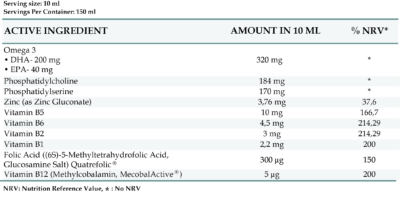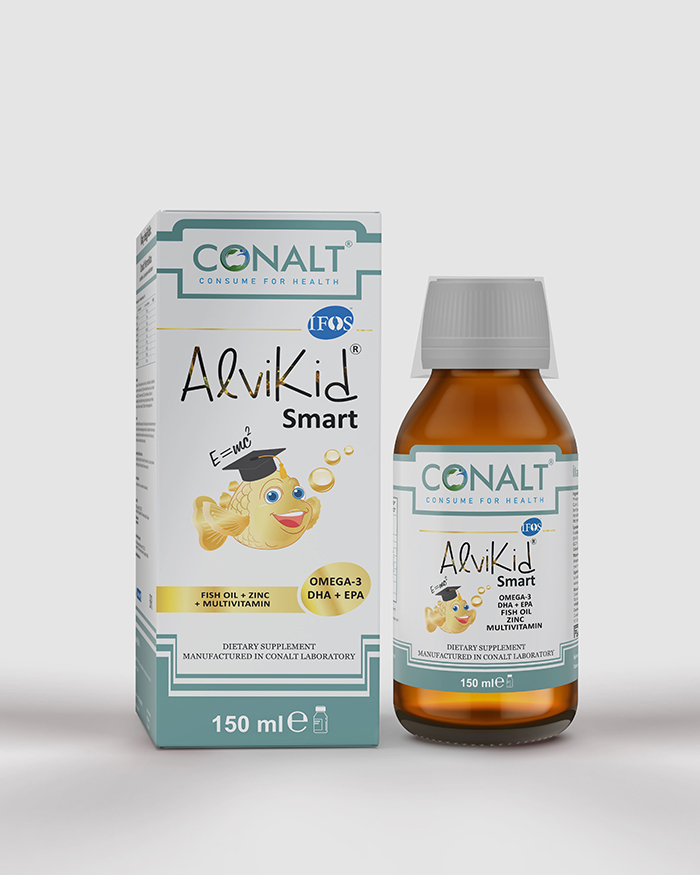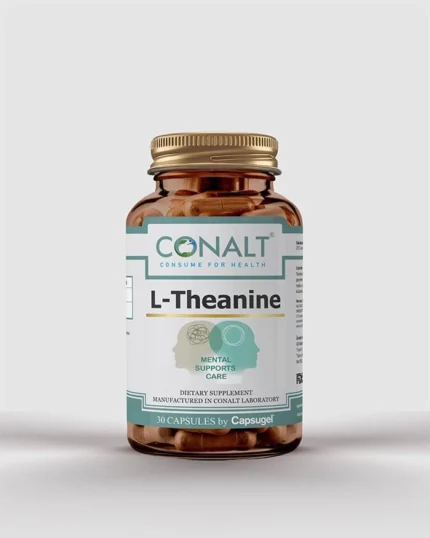CONALT® Alvikid Smart 150 Ml
150 ML
- Supports Cognitive and Intelligence Development
- Supports Brain Development and Mental Health
- Supports Immune System Strengthening
- Contributes to Energy and Metabolism
- Contributes to Nervous System and Mental Health
- Anorexia and Health Support
- Supports Eye Health
Why CONALT® Alvikid Smart?
CONALT® Alvikid Smart is a special product that supports children’s cognitive health at the highest level with its high quality IFOS certified Omega 3 content and rich vitamin-mineral formula. IFOS (International Fish Oil Standards) is a certificate that guarantees the purity and quality of fish oils. Products with this certification have been tested for heavy metals, PCBs and other contaminants, ensuring that children get Omega 3 safely.
This formula guarantees purity and effectiveness, while helping to improve memory and concentration thanks to phosphotidylcholine and phosphotidylserine. Omega 3 fatty acids, especially DHA, play a critical role in children’s brain development. Research shows that adequate Omega 3 intake improves cognitive function and memory (*Birch et al., 2007*).
Phosphotidylcholine is a compound that supports cognitive function. Studies show that this compound improves cognitive performance by positively affecting brain health (*Tandy et al., 2009*). Phosphotidylserine supports learning and memory by protecting brain cells. Research shows that this supplement improves cognitive function (*Gattaz et al., 2006*).
CONALT® Alvikid Smart is an ideal choice to support children’s cognitive health with its high quality ingredients. Based on scientific research, this formula helps families contribute to their children’s mental development.
Product Description
CONALT® Alvikid Smart stands out for sourcing its Omega 3 from IFOS (International Fish Oil Standards), one of the world’s most prestigious Omega 3 quality standards. CONALT® Alvikid Smart provides children with the purest and most effective Omega 3 sources, thereby supporting brain development to the highest level and ensuring cognitive health in children. With regular use, significant improvements in cognitive skills such as attention, focus, and memory can be achieved. The contribution of Omega 3 fatty acids to the structural and functional development of the brain has been scientifically proven.
- DHA (Docosahexaenoic Acid)
- DHA is a structural component of the brain and maintains the fluidity of brain cell membranes. It is critically important for brain development and learning capacity, especially in children. It enhances signal transmission between neurons, which improves memory, attention, and problem-solving abilities.
- DHA is necessary for the growth and proper functioning of brain cells. It strengthens synapses and increases neuroplasticity, contributing to learning and mental health.
- DHA is a critical fatty acid for retinal health. It supports the functions of photoreceptor cells in the eye, aiding in visual capacity.
- Phosphatidylcholine
- Phosphatidylcholine is a precursor of the acetylcholine neurotransmitter in the brain. Acetylcholine plays a vital role in memory, attention, and learning processes. Adequate phosphatidylcholine helps maintain and improve cognitive functions.
- It ensures the structural integrity of brain cell membranes, enhancing the communication abilities of nerve cells. It has positive effects on signal transmission between neurons and overall brain health.
- Phosphatidylserine
- Phosphatidylserine is a phospholipid that supports the functionality of brain cells and communication between nerve cells. It improves memory, attention, and learning functions.
- Found in neuron membranes, phosphatidylserine supports cellular signaling and the renewal of nerve cells. It preserves the healthy functioning of brain cells and reduces the mental impact of stress.
- Phosphatidylserine helps balance cortisol levels, reducing stress and positively affecting mood.
- Zinc Gluconate
- Zinc is a critical mineral for the functionality of immune cells. It supports the production of T and B cells, enhancing the body’s ability to fight infections.
- Zinc is essential for neurotransmitter production and nerve cell development. It contributes to memory and learning processes.
- Zinc deficiency can lead to loss of appetite and growth retardation. Zinc supports the production of appetite-regulating hormones like leptin, preventing appetite loss.
- Vitamin B5 (Pantothenic Acid)
- Pantothenic acid is required for the production of coenzyme A (CoA), which supports the metabolism of carbohydrates, fats, and proteins, increasing the energy production capacity of cells.
- It supports the functioning of the adrenal glands, helping balance stress hormones. This enhances the ability to cope with stress and positively affects mood.
- Vitamin B6 (Pyridoxine)
- Vitamin B6 plays a critical role in the synthesis of neurotransmitters (serotonin, dopamine, GABA), which affect mental processes such as memory, learning, and emotional regulation.
- Vitamin B6 is involved in the production of neurotransmitters that regulate nerve transmission. Its deficiency has been linked to depression, anxiety, and nervous disorders.
- Vitamin B6 strengthens the immune system by increasing antibody production.
- Vitamin B2 (Riboflavin)
- Riboflavin is a component of the FAD and FMN coenzymes, which play essential roles in energy metabolism. It is a critical factor in energy production within cells.
- Riboflavin protects eye cells from oxidative damage and helps prevent eye diseases such as cataracts.
- Riboflavin supports the protection of nerve cells and promotes the proper functioning of neurological processes.
- Vitamin B1 (Thiamine)
- Thiamine provides energy for nerve cells. By increasing glucose metabolism in the brain, it supports mental functions. Its deficiency can lead to mental confusion and memory loss.
- Thiamine supports nerve transmission and maintains the health of nerve cells. Thiamine deficiency can also lead to mental disorders like anxiety and depression.
- Folic Acid (Methylfolate)
- Folic acid is required for DNA synthesis and cell division. It plays a crucial role in the development of the nervous system, especially during pregnancy.
- Folic acid supports the immune system by increasing the production of white blood cells. It also helps repair DNA damage and aids in cellular renewal.
- Vitamin B12 (Methylcobalamin)
- Vitamin B12 plays a critical role in the production of the myelin sheath, which surrounds nerve cells and accelerates nerve transmission, supporting mental functions such as learning and memory. B12 deficiency has been linked to cognitive decline and forgetfulness.
- Vitamin B12 plays a vital role in protecting and renewing nerve cells. It also participates in the production of neurotransmitters like serotonin, which regulate mood.
- B12 supports cellular energy production and increases red blood cell production, improving oxygen transport and reducing fatigue.
Ingredients

Ingredients: Deionized Water, Stabilizer: Sorbitol (E420), Glycerin (E422), Fish Oil, Phosphatidylcholine, Phosphatidylserine, Emulsifier: Polysorbate-80(E433), Flavoring: Orange Flavor, Thickening Agent: Xanthan Gum (E415), Zinc Gluconate, D-Pantothenate Calcium, Preservatives: Potassium Sorbate (E212), Sodium Benzoate (E211), pH Regulator: Citric Acid(E330), Pyridoxine Hydrochloride, Riboflavin, Thiamine Hydrochloride, Sweetener: Sucralose (E955), 6S-5-Methyltetrahydrofolic Acid Glucosamine Salt, Methylcobalamin.
Suggested Use
For children aged 4 to 10 years, it is recommended to take 10 ml once daily, and for adults aged 11 and older, to take 10 ml twice daily.
Warnings: Do not exceed the recommended daily dose. Cannot be used for the prevention or treatment of diseases. Food supplements cannot replace a normal nutrition. Keep out of the reach of children. Consult your doctor during pregnancy and lactation and case of illness or medication.


CONALT’s production is based on the Golden Ratio of Nature












